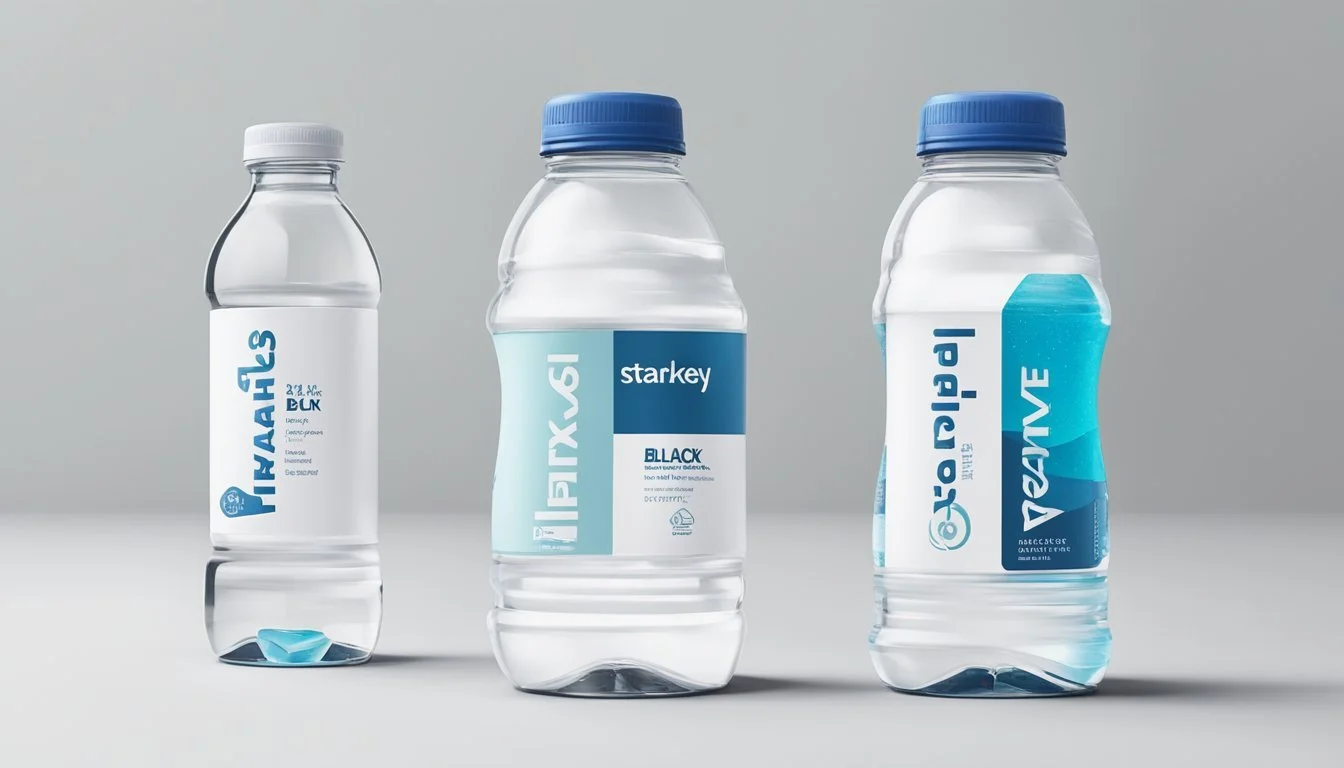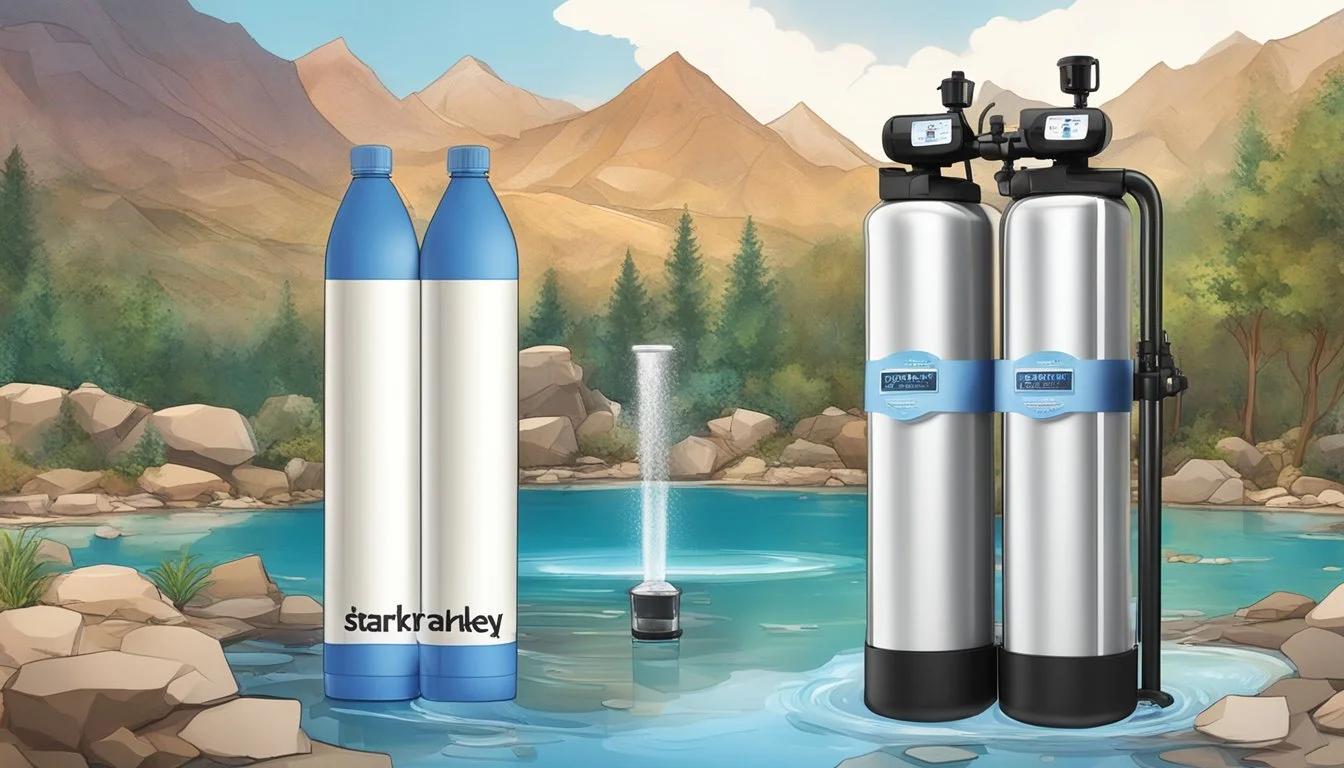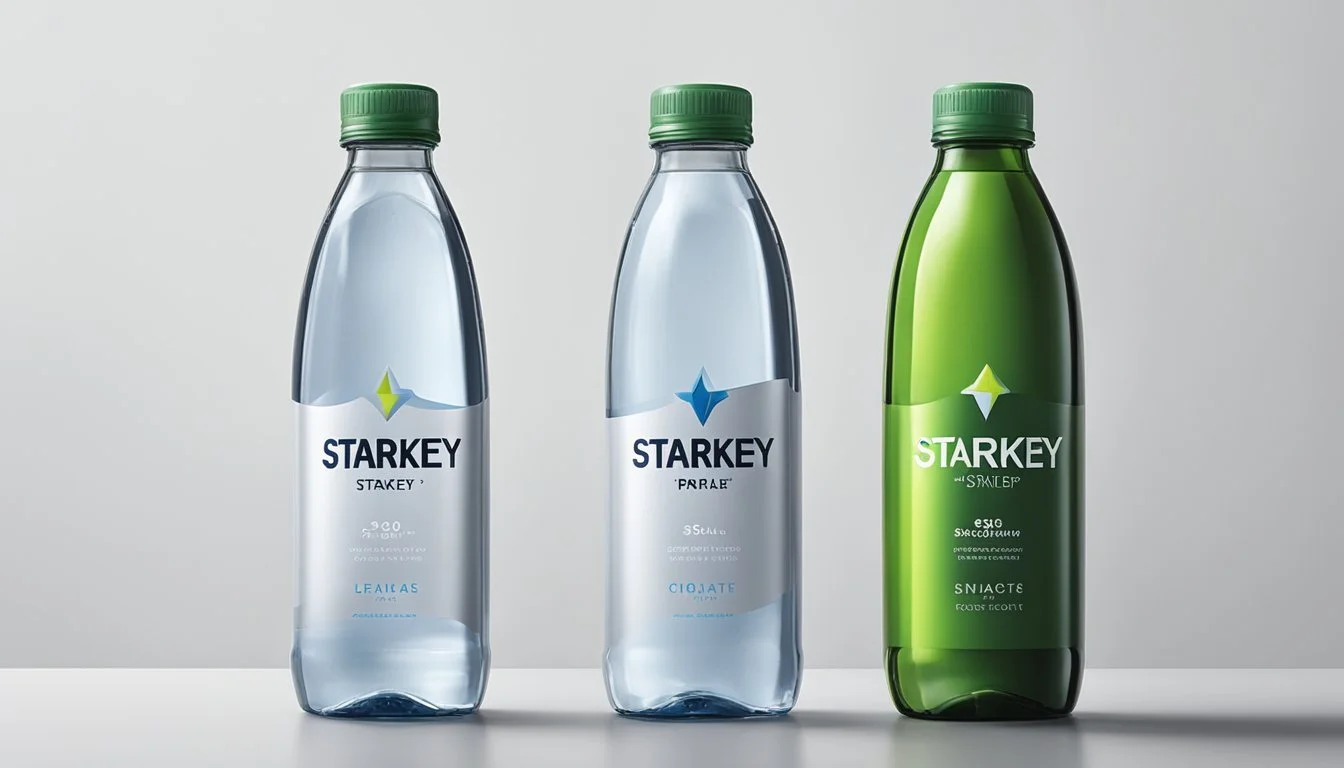Starkey vs. Blk
Which Bottled Water is Better for You?
If you're browsing the aisle for a high-end hydration option, Starkey and Blk stand out among premium bottled water brands. Starkey, known for its unique savory flavor, offers a drinking experience that sets it apart from typical water choices. In contrast, Blk water, infused with fulvic minerals, boasts a sleek design and promises enhanced mineral content.
When deciding which to choose, it's crucial to consider personal preferences in taste and desired health benefits. Starkey's distinct taste may appeal to some, while others might prefer the mineral-rich factor of Blk. Both brands come with their own unique qualities, making them notable contenders in today's competitive bottled water market.
Analysis of Starkey and Blk Bottled Water Brands
Starkey and Blk are two distinct bottled water brands, each with unique qualities and market positions. This analysis breaks down their company backgrounds, target market, brand positioning, and availability.
Company Backgrounds
Starkey is owned by Whole Foods Market. It is known for its natural spring water source, which is rich in minerals and void of significant processing.
Blk comes from blk. International and distinguishes itself with its fulvic mineral content. This gives the water a unique black color, originating from naturally occurring organic minerals.
Target Market and Brand Positioning
Starkey appeals to health-conscious consumers drawn to its natural mineral content and Whole Foods' reputation for quality. It is marketed as a premium, naturally sourced water.
Blk targets consumers interested in wellness trends and those intrigued by its unique visual appeal. With its distinct black color and purported health benefits, it positions itself as innovative and trendy.
Availability and Convenience
Starkey can be found primarily in Whole Foods stores. Its distribution is limited compared to more mainstream brands, making it less convenient for consumers who don't shop at these stores.
Blk enjoys wider availability across multiple grocery stores and online platforms. Its presence in various retail and convenience stores makes it easier for a broad range of consumers to find and purchase.
This analysis provides a comprehensive overview of Starkey and Blk bottled water brands, focusing on aspects crucial to understanding their market presence and consumer appeal.
Source and Purification Process
Starkey and Blk bottled waters come from distinct sources and undergo different purification processes. Understanding these differences helps in determining which water suits your preferences best.
Starkey's Geothermal Spring
Starkey water originates from a geothermal spring in Idaho. This source provides naturally occurring mineral-rich water that is bottled at the source. The geothermal spring is located approximately 2 miles below the Earth's surface, where the water absorbs minerals. This contributes to Starkey's unique taste and mineral content.
The filtration process for Starkey water includes natural sedimentation and mild filtration to remove impurities without stripping away the beneficial minerals. FDA regulations ensure the water meets safety standards, granting consumers peace of mind about its purity.
Blk's Purified Water Source
Blk water stands out due to its origin from purified sources. Unlike Starkey, Blk water doesn't come directly from a natural spring but undergoes extensive purification. The water is procured from groundwater or municipal sources and is processed to remove impurities.
Blk water is distinctively black due to the fulvic trace minerals added during the production process. These minerals provide additional health benefits and a unique appearance. EPA guidelines are adhered to, ensuring the water is safe for consumption.
Filtration and Purification Techniques
Starkey employs mild filtration, preserving the water's mineral content. The process involves sedimentation and removal of particulate matter without extensive purification methods, maintaining the natural qualities of the geothermal spring water.
Blk's purification uses reverse osmosis and micro-filtration to achieve high purity. The reverse osmosis process removes contaminants and minerals, producing exceptionally clean water which is then enhanced with fulvic trace minerals. This process is thorough, ensuring the water's purity and adherence to FDA and EPA regulations.
These different purification techniques highlight the variance between Starkey's natural approach and Blk's technological method, giving consumers options based on their preferences for natural mineral composition or purified enhancement.
Health and Hydration
In evaluating Starkey and blk. water, it's essential to look at their hydration levels, health benefits derived from mineral content, and adherence to safety and regulatory standards.
Hydration Levels
Both Starkey and blk. water claim to provide superior hydration. Starkey water is sourced from an ancient geothermal spring, and its natural mineral content supports hydration.
blk. water is alkaline, with a higher pH, which some believe helps with hydration. Smartwater, for example, demonstrates alkaline water's benefits such as improved sleep quality and gut health.
Starkey water naturally contains minerals that aid in hydration absorption. Conversely, blk. water's unique black appearance is due to fulvic minerals, which purportedly deliver enhanced hydration and cellular absorption.
Health Benefits of Mineral Content
Starkey water contains naturally occurring minerals such as calcium, magnesium, and silica, essential for bone health and metabolic functions. These minerals provide significant health benefits, contributing to improved bodily functions and overall wellness.
blk. water boasts a unique blend of fulvic minerals, which are associated with enhanced nutrient absorption and energy levels. Fulvic minerals in blk. water may also support gut health and immune system functionality, making it appealing for individuals seeking additional health benefits beyond simple hydration.
Safety and Regulatory Compliance
Starkey water meets all FDA and EPA guidelines for bottled water safety. The source's consistent geological conditions contribute to its purity and adherence to stringent health standards.
blk. water also complies with FDA and EPA regulations, ensuring its safety for consumption. The unique processing involved in adding fulvic minerals to blk. water is subject to rigorous quality control, which guarantees that consumers receive a safe product.
Both brands emphasize their adherence to regulatory standards, providing consumers with confidence in their safety and quality. This includes regular testing and certification processes to ensure compliance with all applicable safety guidelines.
Water Quality and Flavor Profile
When comparing Starkey and Blk bottled waters, it's crucial to examine factors such as taste, pH levels, mineral content, and potential contaminants. This section outlines how these elements influence the overall quality and flavor of each brand.
Taste Test Comparisons
Starkey water is known for its clean, neutral flavor, often appreciated for its simplicity. Blk water, despite its dark appearance, has a surprisingly clear and neutral taste as well.
In taste tests, Blk's water sometimes includes subtle undertones of minerals due to its fulvic trace minerals, which may add a hint of earthiness.
Both waters excel in delivering a refreshing experience without any overpowering flavors or artificial tastes.
Impact of pH Levels and Minerals on Taste
Starkey water boasts a naturally alkaline pH of around 9.6, which is higher than many bottled water brands. This high alkalinity can give it a smoother, less acidic flavor. The mineral content in Starkey is well-balanced, providing essential electrolytes and beneficial minerals without altering the taste significantly.
Blk water also possesses a unique pH level, generally around 8.0-8.5. The presence of fulvic trace minerals not only contributes to its black color but can also subtly affect its taste, adding mild mineral notes.
These pH levels and minerals are essential for those seeking water with potential health benefits.
Presence of Contaminants and Purity
Starkey takes pride in its deep well sources, ensuring a high level of purity. It undergoes rigorous filtration and testing processes to maintain its clean profile. This results in water that is virtually free of contaminants, providing a pure drinking experience.
Blk water follows stringent standards to ensure its fulvic-enhanced water is free from harmful contaminants.
Its production process focuses on preserving purity while infusing beneficial minerals. Both brands excel in offering safe, contaminant-free bottled water, giving consumers confidence in their quality and safety.
Nutritional Value and Additives
Both Starkey and Blk bottled water brands offer distinct nutritional profiles and added health benefits. This section investigates the specific electrolytes, mineral enrichment, and additional ingredients, alongside sugar and preservatives content.
Electrolytes and Mineral Enrichment
Starkey water is known for its mineral-rich content, particularly high levels of beneficial electrolytes such as magnesium, calcium, and sodium. These electrolytes help in maintaining proper hydration, muscle function, and overall cellular health.
Electrolyte Starkey (mg/L) Blk (mg/L) Magnesium 42 N/A Calcium 57 N/A Sodium 170 N/A
Blk water, on the other hand, is enriched with fulvic acid, which imparts a variety of trace minerals albeit in smaller quantities. While it lacks the specific higher electrolyte concentrations found in Starkey, the fulvic acid offers a unique set of health benefits.
Added Ingredients for Health
Starkey water prides itself on being a natural spring water with no additional ingredients. It relies on its naturally occurring minerals to provide health advantages. This makes it a pure choice for those seeking a straightforward hydration option.
Blk water offers a distinctive proposition with its inclusion of fulvic trace minerals, which turn the water black. These minerals are reported to have several health-promoting properties, including improved nutrient absorption and antioxidant effects. Although fulvic acid is the main additive, it also contains various other trace minerals naturally occurring in the acid itself.
Sugar and Preservatives Content
Neither Starkey nor Blk water contains any added sugars or preservatives, which is advantageous for those looking to avoid unnecessary additives. The absence of sugar and preservatives ensures that both waters offer a clean and natural hydration experience.
Starkey Water:
Sugar: None
Preservatives: None
Blk Water:
Sugar: None
Preservatives: None
This lack of sugar and preservatives makes them suitable for a variety of dietary preferences and health needs, providing pure hydration while avoiding any potential negative effects associated with such additives.
Product Variety and Types of Water
Starkey and Blk offer a diverse range of products tailored to different preferences and needs. These include options for still vs. sparkling water, flavored water varieties, and unique specialty waters.
Still vs. Sparkling Water
Starkey primarily focuses on providing still water, renowned for its high mineral content and naturally alkaline properties. This attracts health-conscious consumers seeking a simple, refreshing hydration solution. Blk, on the other hand, offers still water infused with fulvic trace minerals, giving it a unique black color and adding beneficial minerals.
When it comes to sparkling water, Starkey does not typically carry this variety. Blk also does not venture into sparkling waters, focusing instead on enhancing the wellness benefits of still water with their unique mineral inclusion.
Flavored Water Options
Flavored water is a growing category in the bottled water market. Starkey does not currently offer flavored water options, sticking with its natural still water. This decision aligns with its branding as a pure and clean water choice, free of artificial additives or flavorings.
Blk also does not feature flavored water in its product lineup. Their niche revolves around the distinctiveness of the fulvic minerals, which do not lend themselves well to additional flavoring. This positions Blk away from the flavored segment, emphasizing its natural, nutrient-rich profile.
Specialty Waters and Product Lines
For specialty waters, Starkey excels in its naturally alkaline mineral water, sourced from deep below the Earth's surface. This makes it appealing to those looking for a premium, mineral-rich hydration option. Starkey's emphasis on purity and natural composition ensures a consistent and high-quality product.
Blk, distinguished by its fulvic-enhanced water, markets itself with a unique selling point. The fulvic minerals in their water not only create its distinct black appearance but also claim to offer antioxidant benefits, distinguishing it from ordinary bottled waters. This targets consumers interested in alkaline water and wellness-oriented beverages.
Starkey focuses its efforts on a single, high-quality product line, whereas Blk leverages its unique mineral infusion to stand out in the competitive bottled water market. Each brand offers something distinct, catering to different consumer preferences and needs.
Environmental Impact and Sustainability
In comparing the environmental impact and sustainability of Starkey and Blk bottled water, it's essential to evaluate their bottling processes, packaging materials, and the sustainability efforts implemented by each brand. This analysis seeks to understand how each brand contributes to or mitigates environmental challenges.
Bottling Processes and Carbon Footprint
Starkey and Blk use distinct bottling processes that lead to different carbon footprints. Starkey sources its water from geothermal springs, which often requires less energy-intensive processes in bottling. This focus on natural sourcing can potentially reduce the overall emissions in comparison to more industrial approaches.
Blk, on the other hand, infuses its water with fulvic minerals, necessitating additional steps in its production process. These additional steps can increase the energy consumption, thereby contributing to a higher carbon footprint.
Eco-Friendly Packaging and Reusability
Starkey has been known to prioritize the use of glass bottles. Glass is an environmentally friendly option as it is endlessly recyclable and does not degrade in quality over time. This choice reduces waste and promotes reusability among consumers.
Blk opts for plastic bottles infused with a mineral blend. While lightweight and convenient, these plastic bottles contribute significantly to global plastic waste. In recent times, the brand has been exploring improvements in their packaging to incorporate more sustainable materials.
Sustainability Efforts by Brands
Starkey's commitment to sustainability extends beyond its bottling and packaging. The brand engages in various water protection initiatives and takes part in geothermal research to ensure a continuous and responsible water source.
Blk is also stepping up its sustainability game by investing in recycling programs and partnering with environmental organizations. These efforts aim to offset some of the environmental impacts related to their plastic usage and promote broader environmental awareness.
By focusing on these critical aspects, the examination of Starkey and Blk's environmental impact and sustainability initiatives highlights each brand's steps towards minimizing their ecological footprints. Starkey's use of glass and geothermal resources offers a slight edge in sustainability. Blk is making considerable strides through innovative material use and active recycling efforts.
Cost Comparison and Value for Money
When comparing the costs of Starkey and blk. bottled waters, it is clear that price plays a significant role in their market positioning. Starkey often retails at a higher price point, with bottles typically ranging from $2 to $3 each.
In contrast, blk. water is usually more affordable, with prices averaging around $1.50 to $2 per bottle. This makes blk. a more economical choice for regular hydration.
Demand and Availability
Starkey's premium pricing is reflected in its more limited availability. It is often found in specialty stores and high-end supermarkets. Meanwhile, blk.'s lower cost and unique marketing appeal have made it more widely available in various retail outlets.
Value for Money
Despite Starkey's higher cost, it offers a mineral-rich composition that some consumers find valuable. On the other hand, blk. water, infused with fulvic minerals, often appeals for its novelty and distinctive black color, which adds perceived value.
Key Points
Starkey:
Cost: $2-$3 per bottle
Demand: Specialty and high-end markets
Value: Mineral-rich, premium hydration
blk.:
Cost: $1.50-$2 per bottle
Demand: Broad availability
Value: Unique appearance, fulvic minerals
Each brand appeals to different consumer preferences, balancing cost against perceived health benefits and uniqueness.
Final Verdict
After analyzing both Starkey and Blk bottled water varieties, it's clear that both have unique attributes catering to specific consumer preferences. Below, we break down the comparison and provide tailored recommendations for different needs.
Comparison Summary
Water Source and Purity: Starkey stands out for its purity, sourced from deep geothermal springs, providing naturally alkaline water with a pH of 9.6. Blk, in contrast, is a fulvic-enhanced mineral water, infused with trace minerals and electrolytes.
Taste and Alkalinity: The taste profiles also differ; Starkey has a smooth, clean taste due to its high alkalinity. Blk's earthy flavor stems from the fulvic minerals, appealing to those looking for a mineral-rich experience.
Packaging: Starkey uses minimalist plastic bottles emphasizing purity and simplicity. Blk's distinctive black bottles, emphasizing a bold and innovative image, attract consumers who value unique branding.
Recommendations for Different Consumer Needs
Health-Conscious Consumers: For individuals prioritizing high pH levels and natural spring sources, Starkey is the clear choice. It’s best suited for those pursuing alkaline water for its potential health benefits.
Mineral-Enthusiasts: Blk appeals to those interested in additional minerals and electrolytes. Its fulvic-enhanced profile offers benefits like improved hydration and electrolytic balance, making it ideal for athletes and active individuals.
Eco-Friendly Shoppers: Neither brand emphasizes eco-friendly packaging prominently, but Starkey’s minimalist design may appeal slightly more to eco-conscious consumers seeking simpler packaging.
Distinctive Branding: Blk stands out with its bold, distinctive black bottle, perfect for those seeking aesthetically unique and visually appealing products. It draws attention on shelves, making it a conversation starter.
More About Starkey
Icelandic Glacial vs Starkey: Which Bottled Water is Better?
Mountain Valley Spring Water vs Starkey: Which Bottled Water is Better?
Starkey vs Kirkland Signature: Which Bottled Water is Better?
Starkey vs Richard's Rainwater: Which Bottled Water is Better?
Starkey vs Whole Foods Italian Still Mineral water: Which Bottled Water is Better?





